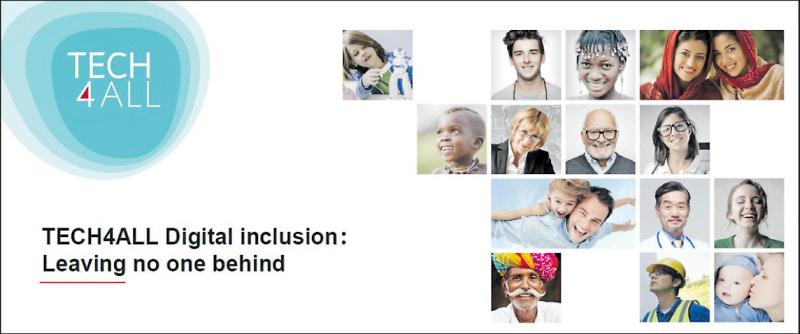- Chinese tech giant aims to ‘leave no one behind’
Amidst the Fourth Industrial Revolution, Sri Lanka has been lagging behind in fully embracing digital transformation to drive sustainable development. In order to promote such inclusion, Huawei Technologies Lanka is set to bring to Sri Lanka their long-term digital inclusion initiative “TECH4ALL”, with the theme of “Leaving no one behind”.
During a presentation at a media networking session, Huawei Enterprise Business Group in Sri Lanka Vice President Indika De Zoysa stated that the vision of the initiative is to bring digital resources to every person, home, and organisation for a fully connected, intelligent world.
This initiative has already been launched in several countries in the region, such as Bangladesh, Malaysia, and the Philippines, improving four key domains which include education, environment, health, and development. These domains have their respective goals of enabling equity and quality in education, mitigating the effects of climate and enabling nature conservation, enabling inclusion and equity in health, and using ICT (Information and Communications Technology) to boost rural development.
Outside of Asia, the initiative is also widely present throughout Africa, and has had success digitising the education sectors of several African countries. Their success was evident in 2019, when DigiTruck “Skills on Wheels”, a mobile, solar-powered classroom, with the aim of bringing digital skills to under-served communities, provided training for more than 1,500 young adults and teachers in rural areas in Kenya. It is a success the company hopes to replicate in countries like France, the Philippines, and several others in the next two years.
Furthermore in South Africa, the TECH4ALL initiative recently launched the DigiSchool project, which aims to connect 100 urban and rural primary schools over the next year, in addition to the 12 already connected through 5G technology.
The initiative was launched in Sri Lanka earlier this year, but its progress was slowed down due to the current Covid-19 pandemic. Two of their programmes have already been launched in the country. These include “Seeds for the Future”, which takes a group of 10 to 12 university students to China where they can interact with other international students and learn new technology trends, and for the second programme, Huawei has partnered up with the University of Moratuwa and General Sir John Kotelawala Defence University (KDU) to open two research labs to promote digital adoption.
In his presentation, De Zoysa stated that there are three critical ways for ICT to drive sustainable development and help countries, governments, and cities achieve the Sustainable Development Goals (SDGs). These include increased access to information and services, increased connectivity between people and organisations, and increased productivity and resource efficiency.
“A country cannot progress without adapting to the rapid technological changes taking place. It is with this in mind that our policies will create the environment required to develop the IT competencies and language skills of future generations, in order to enable them to conquer global markets,” he said in his presentation.
He stated that their three priorities are technology, application, and skills. The technology aspect is to make connectivity affordable and remove coverage barriers through innovations in connectivity, AI (artificial intelligence), the cloud, and mobile devices. The application aspect is to create digital ecosystems and help developers build applications for different communities and industries. Finally, the skills aspect is to work with local governments, communities, organisations, and other partners to enhance the digital skills of society.
During his presentation, De Zoysa named 2021-2030 the “Decade of Skills Development”, with goals that include reducing the population of unskilled labour to 10%, providing higher education opportunities to every student, creating global technocrats and positioning Sri Lanka as the epicentre of human resource development in Asia.
“The 21st Century is known as the knowledge-centric century. In order to remain competitive globally, it is imperative that ICT is integrated with every sector of the economy,” he said.

